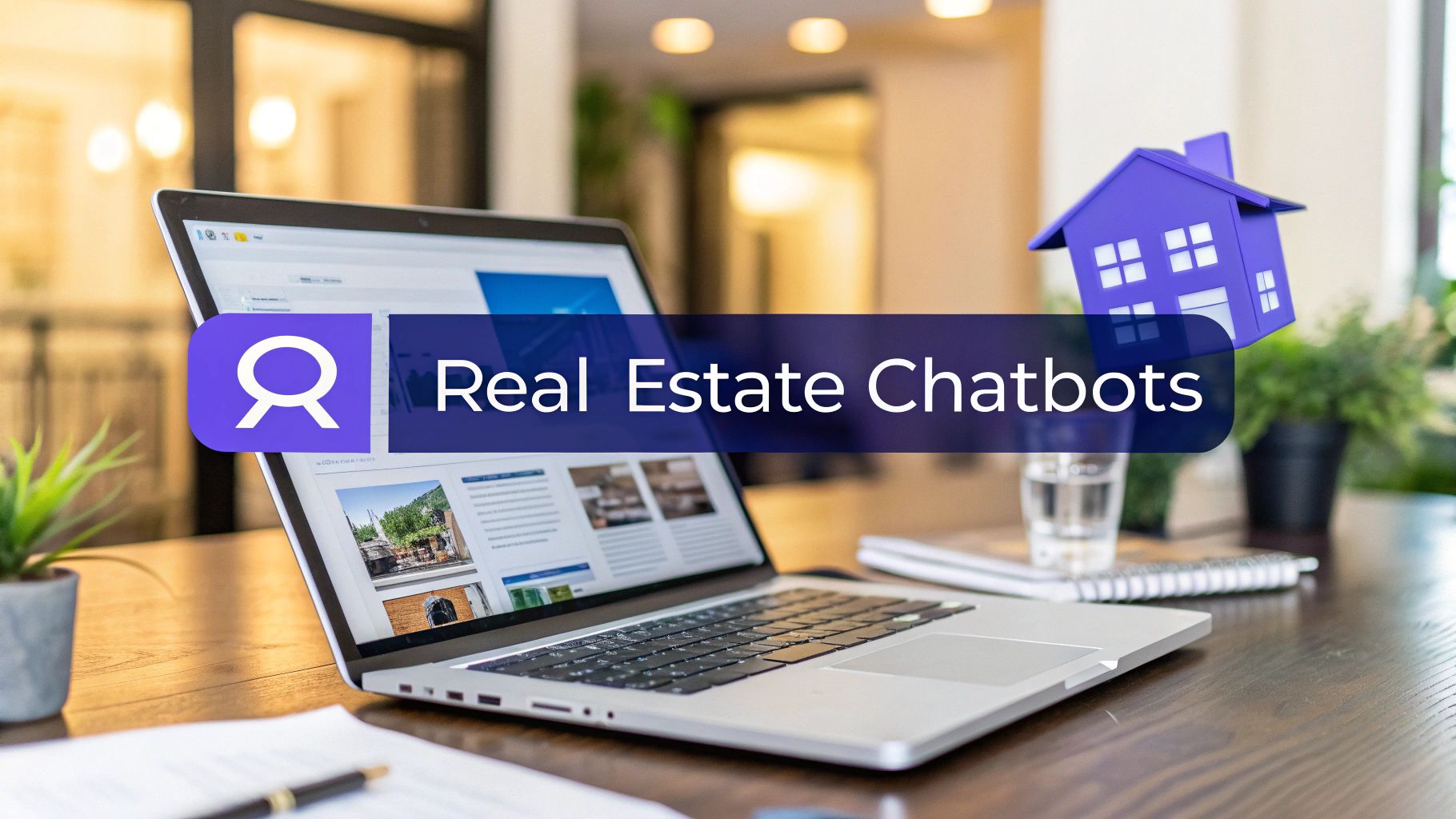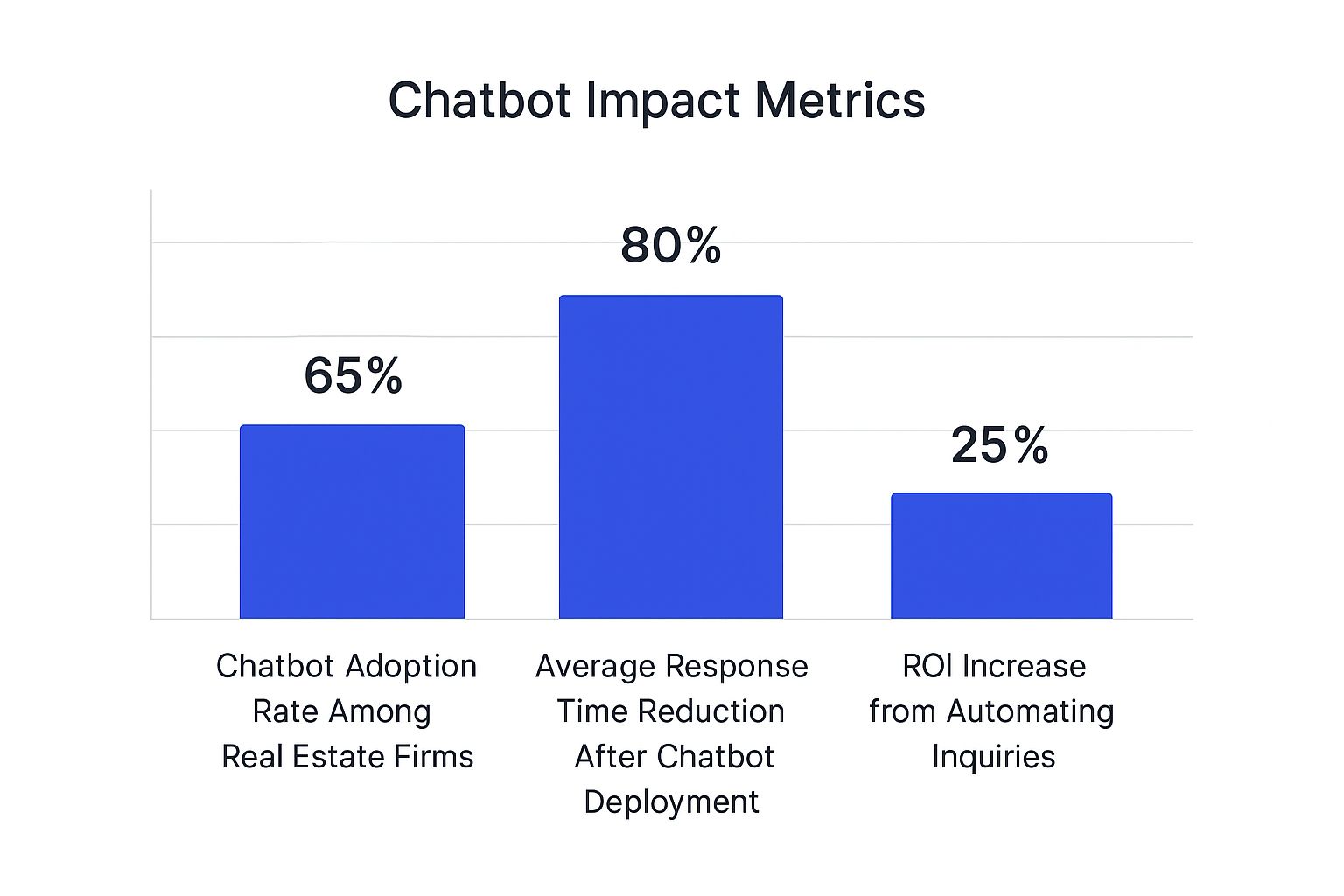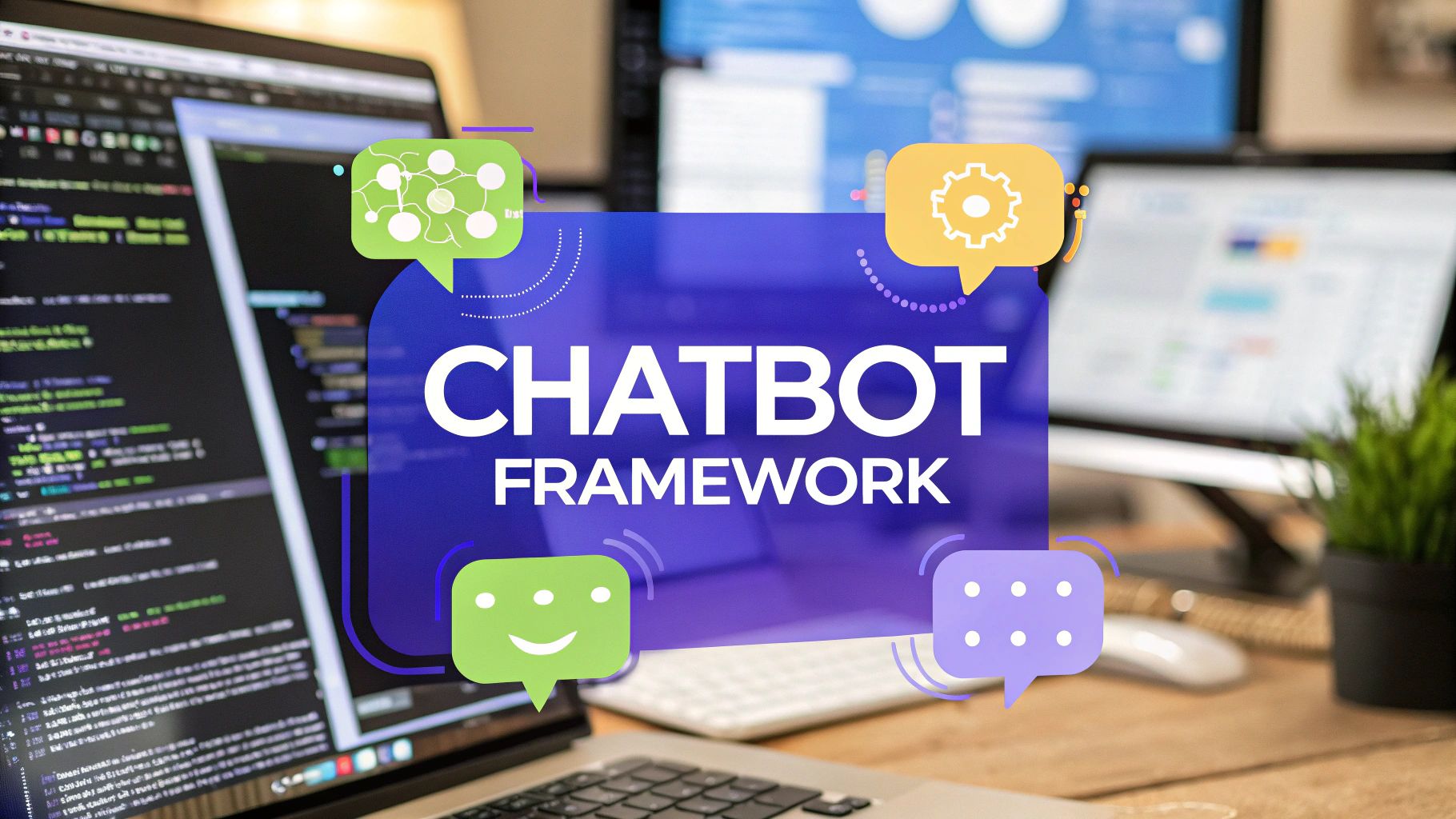Boost Sales with Chatbots for Real Estate | Automate Leads & Viewings
Learn how chatbots for real estate can automate lead generation, schedule viewings, and help agents close more deals efficiently. Boost your business today!

Picture this: a digital assistant working for you around the clock. It greets every single person who lands on your website, answers their first few questions, and even figures out if they're a serious lead, all without you lifting a finger. That's what chatbots for real estate do. They're the answer to lost opportunities from missed calls and delayed emails, giving modern clients the 24/7 communication they've come to expect.
How Chatbots Are Reshaping Real Estate Conversations
In real estate, a few hours can mean the difference between a signed contract and a lost client. Think about it: a potential buyer is scrolling through listings at 10 PM on a Tuesday. They have a question. They're not going to wait until you're back in the office the next morning.
And they're not alone. A staggering 97% of homebuyers now start their property search online, which means a constant flood of inquiries at all hours. For a busy agent, that's a huge challenge. Every missed message about property details or neighborhood amenities is a potential sale slipping through your fingers.
Bridging the Communication Gap
This is where chatbots step in, acting as your first line of communication. They instantly engage with visitors the second they show interest. It’s like having a digital concierge for your agency, always on and ready to help. That immediate interaction is what keeps potential clients on your site instead of clicking over to a competitor.
This automated assistant handles all the repetitive, time-sucking conversations that eat up your day. For example, a chatbot can:
- Answer common questions about a specific listing.
- Share details about local schools or parks.
- Collect basic contact info from a potential lead.
By taking care of these initial touchpoints, chatbots free you up to do what you do best: building relationships and closing deals with clients who are truly ready to move forward. You get to jump into a conversation that's already been warmed up, armed with all the key details the chatbot has already gathered.
A well-designed chatbot makes sure every visitor gets a prompt, helpful response. It instantly makes your agency look more professional and attentive than others still relying on manual follow-ups.
Setting the Stage for Meaningful Interactions
Let's be clear: the goal here isn't to replace agents. It's to support them. A real estate chatbot acts as a filter, sorting the serious prospects from the casual browsers.
When a lead starts asking more specific questions or shows real buying intent, the chatbot can seamlessly hand off the conversation to you or another agent. This means you're spending your valuable time on high-intent leads, not sifting through dozens of "just looking" messages. Instead, you're connecting with pre-qualified people who already have the basic info they need, making every conversation far more focused and productive from the get-go.
The Core Benefits of Using Chatbots for Your Agency

Let's be honest, the real estate game is all about speed and service. Bringing a chatbot into your agency is a practical way to get ahead, impacting your daily work and your bottom line. These tools are about creating efficiency and giving clients a stellar experience from the moment they land on your site.
Think about it. A potential buyer is browsing your listings at midnight. They don't have to wait until you're back in the office to get their questions answered. A chatbot can jump in right away, grabbing their contact info and asking the important qualifying questions about budget, location, and how soon they're looking to move.
That instant connection means you never miss a lead. Every single visitor who chats with the bot is logged and ready for you to follow up with. Your website stops being a passive brochure and becomes a lead-generating machine that works around the clock, even while you sleep.
Offer Around-the-Clock Customer Service
Another massive win is being able to offer 24/7 customer service. Today's clients expect answers now, and a chatbot delivers. It can juggle a ton of common questions at once without any human help, freeing you up to handle the more complex, high-touch parts of the job.
Imagine a client asking about the school district for a specific property or what the annual taxes are. A well-designed bot can pull that data in a split second. This keeps them engaged on your site and makes your agency look sharp, responsive, and modern.
This isn't just a niche trend. By 2025, it's expected that 28% of real estate businesses worldwide will be using live chat and chatbots as a core part of how they talk to clients. The market moves fast, and quick responses are everything.
Automate Appointment Scheduling Seamlessly
The endless email tennis of scheduling property viewings is a huge time suck. Chatbots completely solve this by hooking directly into your calendar. A potential buyer can ask for a viewing, see your open slots, and book a time that suits them without ever leaving the chat window.
This kills the friction and delays that come with manual scheduling. The benefits are pretty clear:
- Less Admin Work: You spend way less time managing calendars and more time actually prepping for meetings.
- Fewer No-Shows: Automated reminders can be sent out to clients before their appointment.
- Happy Clients: Buyers love how easy and fast it is to book a viewing on their own terms.
This one feature alone can easily save agents hours every single week, letting them focus on what really moves the needle: negotiating deals and building client relationships.
Create a Better Client Experience
When you add it all up, these benefits create a much better overall experience for your clients. When a buyer or seller gets instant, helpful answers, their first impression of your agency is a positive one. That kind of responsiveness builds trust right away and puts you miles ahead of competitors who might take hours or even days to reply.
A chatbot acts as your digital front desk, a knowledgeable first point of contact that manages every single inquiry with speed and professionalism. That positive first touch sets the tone for the entire relationship.
This immediate support makes the entire property search feel smoother and less frustrating. By offering a better experience from the get-go, you dramatically increase the chances of turning a casual browser into a loyal, paying client. Of course, to pull this off, you need to follow solid chatbot design principles to make sure the conversation feels natural and genuinely helpful, not robotic.
Everyday Scenarios Where Real Estate Chatbots Excel

It’s one thing to talk about benefits, but it's another to see how a tool actually works in the real world. A chatbot is an active part of how you engage with clients. By handling specific, predictable tasks, it creates a much smoother ride for both buyers and sellers, making your agency run a whole lot better.
Let's walk through a few practical, day-to-day situations where these digital assistants really shine. These examples show how a bot can manage different parts of the client journey, from the moment someone lands on your site to scheduling that all-important first meeting.
Assisting the Eager Homebuyer
Picture this: it's late on a Friday night, and a motivated buyer lands on your website. They have a clear idea of what they want. Without a chatbot, they might browse a few listings, get frustrated by a lack of immediate answers, and leave, probably straight to a competitor.
But with a chatbot, the whole interaction changes.
- Greeting and Qualifying: The bot pops up with a friendly, "Hi! Looking for your dream home? I can help. What's your ideal number of bedrooms?"
- Gathering Criteria: It then asks a few more key questions, like budget and preferred neighborhoods. For instance, the buyer might say they want a three-bedroom home under $500,000 in the "Northwood" area.
- Searching and Presenting: The bot, which is hooked up to your MLS feed, instantly pulls matching properties. It shows two or three relevant listings right there in the chat window, complete with images and key details.
- Scheduling a Viewing: Finally, it offers the next logical step: "I see a few great options for you. Would you like to schedule a time to see them in person this weekend?" The buyer can then pick a time from your calendar, right in the chat.
This entire conversation happens in minutes. What started as a passive website visit has now turned into a qualified lead with a scheduled appointment. The bot captures all the necessary info and hands it off to an agent for a warm follow-up. Easy.
Engaging Potential Sellers
Chatbots are just as powerful for homeowners who are thinking about selling. Most sellers start their journey by trying to figure out what their home is worth. A chatbot can use this curiosity as the perfect hook to start a conversation and get their details.
For example, a visitor clicks a "Get a Free Home Valuation" button. The chatbot kicks off a simple, guided process:
- Address Collection: The bot asks for the property address to get started.
- Property Details: It follows up with questions about the number of bedrooms, bathrooms, and any recent renovations.
- Contact Information: To deliver the estimate, the bot asks for an email and phone number, explaining that a full report will be sent by a local market expert (that's you!).
This automated valuation tool is a fantastic lead magnet. The seller gets instant value, a ballpark estimate of their home's worth, and you get a high-intent lead with all the info you need for a personalized follow-up call.
A chatbot turns a simple inquiry into a rich data profile. Instead of just a name and email, you get the property address, key features, and a clear signal that they’re thinking about selling.
Acting as a Virtual Property Guide
Chatbots can also add an interactive layer to your individual property listing pages. When a visitor is looking at a specific home, a chatbot can act like a knowledgeable guide, ready to answer questions about that particular property on the spot.
Someone viewing a listing might ask:
- "What year was the roof last replaced?"
- "Are the kitchen appliances included in the sale?"
- "What are the local elementary school ratings?"
By training the chatbot on specific property data, it can provide instant, accurate answers to these detailed questions. This keeps potential buyers engaged with the listing and helps them get the info they need to move forward, positioning your agency as transparent and helpful from the very first click.
Turning More Website Visitors into Qualified Leads
A busy website is a great sign, but traffic alone doesn't pay the bills. The real goal is turning those anonymous visitors into genuine, high-quality leads you can actually work with. This is where a real estate chatbot becomes a powerful conversion engine.
Think of it this way: when someone lands on your site, a chatbot doesn't just sit there waiting for them to fill out a form. It proactively starts a conversation, asking the right questions to figure out what they need. That immediate, personal touch is often what separates a casual browser from a serious buyer.
By analyzing what a visitor asks and the info they share, the chatbot intelligently sorts them. This means that by the time a lead hits your inbox, you already know their budget, ideal location, and timeline. It’s like having a virtual assistant who flags the hottest prospects for you right away.
Nurturing Leads for the Long Haul
Not every lead is ready to buy a house today. Some might be months or even a year out from making a move. A chatbot is brilliant at keeping these long-term prospects engaged by automating the follow-up.
Imagine a potential buyer who’s just starting their search. The chatbot can be set up to:
- Send an alert when a new listing that fits their criteria hits the market.
- Provide a monthly market update for their neighborhoods of interest.
- Check in every so often to see if their homebuying timeline has changed.
This kind of consistent, helpful contact keeps your agency top of mind. When they’re finally ready to start scheduling viewings, who do you think they'll call first? This approach turns your website into a lead-nurturing machine, not just a simple lead-capture page.
The impact these tools have is pretty significant, as the stats below show.

The data makes it clear: chatbots deliver real, measurable results, from faster response times to a serious bump in your return on investment.
Turning Interaction into Action
At its core, a chatbot’s job is to guide visitors toward a specific next step, like scheduling a call or booking a property tour. This is miles more effective than a passive "Contact Us" form just sitting on a page. In fact, research shows that 39% of companies started using chatbots to make their websites more interactive and keep people on the site longer.
Let’s break down how specific features translate directly into a stronger sales pipeline.
Chatbot Features and Their Impact on Real Estate Sales
By offering instant answers and a clear path forward, a chatbot smooths out the whole process. It turns a simple website visit into a productive conversation that moves someone one step closer to becoming a client.
This focus on converting traffic is what builds a sustainable business. Instead of just crossing your fingers and hoping visitors will reach out, you’re actively engaging them, qualifying their interest, and guiding them through your funnel. It's a structured approach that helps you spend your time on conversations that actually lead to a sale.
To go deeper on this, check out our guide on lead generation chatbots and how they can fill your pipeline.
How to Choose the Right Real Estate Chatbot
Picking the right digital assistant for your agency feels like a huge decision, but it doesn’t have to be complicated. The goal isn’t to find a tool with the longest feature list; it’s about finding one that fits your specific business needs. The best chatbots for real estate act as a natural extension of your team, handling the routine stuff so you can focus on clients.
Your first step is deciding between a simple rule-based chatbot and a more advanced AI-powered one. Think of a rule-based bot like a phone tree. It follows a pre-set script and gives visitors specific choices. This is a great starting point if you just need to answer basic FAQs or point people to the right page.
An AI chatbot, on the other hand, is more like having a conversation with a trainee. It understands natural language, learns from its interactions, and can handle more unpredictable questions. For a real estate agency looking to qualify leads and provide detailed property info, an AI-powered solution is usually the better long-term choice.
Key Features Your Chatbot Must Have
Once you've decided on the type of bot, it's time to look at the features that will actually make a difference in your day-to-day. Not all platforms are created equal, and for a real estate business, some functions are non-negotiable.
Here are the key features to look for:
- Seamless CRM Integration: Your chatbot absolutely has to talk to your Customer Relationship Management (CRM) software. This is vital for automatically sending lead info, conversation histories, and contact details straight into your system. It kills manual data entry and makes sure no lead ever gets lost in the shuffle.
- Calendar Syncing: This is a massive time-saver. A chatbot that integrates with your calendar can book property viewings and client calls on its own, cutting out all the back-and-forth emails that slow you down.
- Customization Options: The bot needs to reflect your brand. Look for options to customize its look, greeting messages, and overall tone to match your agency’s voice. This kind of consistency is what builds trust with potential clients from the very first click.
The right chatbot doesn't just answer questions; it fits perfectly into your existing sales and marketing process. Strong integration capabilities are the bridge between automated conversations and real business results.
Questions to Ask Potential Providers
Before you commit to a platform, you need to ask the right questions to make sure it aligns with your goals. Treat it like an interview for a new team member. Being prepared will help you see past the sales pitch and find a true partner for your business. For a deeper look, you can also learn more about how to add a chatbot to your website effectively.
Here’s a simple checklist of questions to run through with any chatbot vendor you’re considering:
- How does it integrate with my specific CRM? Don’t just accept a “yes.” Ask them to get specific about the depth of the integration and exactly what data gets synced.
- What level of support do you offer during setup? A good provider will help you get started and make sure the chatbot is configured correctly for your agency’s workflow.
- Can I see a demo of it handling real estate scenarios? Ask them to show you how it qualifies a buyer lead or schedules a viewing in real-time.
- What does the pricing structure look like? You need to know if it's based on the number of contacts, conversations, or a flat monthly fee. This will help you avoid any nasty surprises down the road.
By focusing on these practical features and asking direct questions, you can confidently choose a chatbot that will become a valuable asset for growing your real estate business.
The Financial Impact and Future of Real Estate AI

Let's be clear: adding a chatbot to your website isn't just a tech upgrade. It's a strategic move with a serious financial upside. The return on investment for real estate chatbots really boils down to two things: cutting major costs and driving up revenue.
Think about all the repetitive tasks your team handles. Answering the same questions about property taxes or school districts over and over eats up time that could be spent on high-value work. Chatbots take over these routine inquiries instantly, freeing up your agents to focus on negotiating offers and actually building relationships with clients.
That efficiency flows directly into your bottom line. With a chatbot capturing and qualifying leads 24/7, your pipeline never sleeps. Higher conversion rates naturally follow because every single lead gets an immediate, helpful response, making it far more likely they’ll stick with you instead of bouncing to a competitor.
The Growing Market for AI Chatbots
This shift toward AI isn't a small trend; it's a massive market movement. The global AI chatbot market is on track to hit somewhere between $10 billion and $15 billion by 2025. And guess who's leading the charge? The real estate sector, making up 28% of all adopters, more than retail and finance combined.
The businesses putting these tools to work are seeing incredible results, with some reporting savings of up to $300,000 a year. On a global scale, chatbots are projected to eliminate 2.5 billion labor hours by handling up to 80% of routine customer questions without any human help. If you want to dig into the numbers, this detailed report on AI chatbot stats from Thunderbit.com is a great resource.
A chatbot is no longer some futuristic concept. It's a practical tool for getting ahead. Investing in this technology is a direct investment in your agency's future scalability and profitability.
This rapid adoption is a clear signal that AI is becoming standard operating procedure in modern real estate. Agencies that don't adapt risk getting left behind by more agile, tech-savvy competitors who are already cashing in on the benefits.
What Lies Ahead for Real Estate AI
The evolution of chatbots for real estate is nowhere near finished. The next wave of innovation will embed these digital assistants even more deeply into the client journey. In fact, we’re already seeing advancements that will soon be commonplace.
Here’s a quick look at what’s on the horizon:
- Advanced Voice AI: Soon, clients will be able to just speak their questions to your website or their smart home device and get instant, verbal answers about listings.
- Deeper Personalization: Future chatbots will use past interactions to serve up hyper-personalized property suggestions, almost anticipating a client’s needs before they even ask.
- Proactive Engagement: AI will start triggering conversations based on user behavior. Imagine a bot popping up with a helpful message if someone has been lingering on a specific listing for a while.
These advancements are all about making client interactions feel more natural, intuitive, and ultimately, more effective. By getting a chatbot in place today, you're positioning your agency to easily plug in these future technologies, making sure you stay ahead of the curve and continue to offer a top-tier client experience.
Your Top Questions About Real Estate Chatbots, Answered
I talk to a lot of agents who are curious about chatbots but have some reservations about how they actually work in the real world. It's smart to ask questions. Getting clear answers is the best way to see how this kind of tech can be a straightforward, valuable addition to your business, not just another complicated tool.
Here are the honest answers to the questions I hear the most.
Will a Chatbot Replace Me?
Let's clear this up right away: absolutely not. The entire point of a chatbot for real estate is to act as your assistant, not your replacement. They're designed to handle the repetitive, top-of-funnel tasks that eat up your day, answering the same initial questions over and over, collecting basic contact info, and scheduling viewings.
Think of it as a digital teammate that works 24/7 to pre-qualify leads for you.
A chatbot is a filter. It separates the casual online browsers from the genuinely interested buyers and sellers. Once a lead shows they're serious, the bot can seamlessly hand the conversation over to you. That means you get to spend your time on what you do best: building relationships, negotiating deals, and closing. You’re only jumping into conversations that are much more likely to turn into clients.
How Much Technical Skill Do I Need to Set One Up?
This is probably the biggest myth out there. The truth is, modern chatbot platforms are built for business owners, not developers. Many tools, like Chatiant, give you a no-code or low-code builder, which is just a fancy way of saying you can create a chatbot using a simple drag-and-drop interface. No coding required.
Most platforms even provide ready-made templates specifically for real estate. All you have to do is tweak them to match your brand's voice and your specific business needs. The setup usually just involves a few simple steps:
- Customizing pre-built conversation flows.
- Connecting the bot to your website (often with a single line of code).
- Integrating it with the tools you already use, like your CRM or calendar.
Can a Chatbot Integrate with My Existing Tools?
Yes, and this is where a chatbot goes from a neat gadget to an important part of your workflow. A quality real estate chatbot should connect smoothly with the software you rely on every day. The two most important integrations are with your Customer Relationship Management (CRM) system and your calendar.
When your chatbot syncs with your CRM, it can automatically create new lead profiles and log every conversation. This completely eliminates manual data entry and makes sure no prospect ever falls through the cracks. Then, with calendar integration, the bot can schedule property viewings or client calls directly, saving you a massive amount of back-and-forth emailing.
A chatbot that works in isolation is just a novelty. A chatbot that integrates with your core business systems becomes a true productivity machine, automating workflows and centralizing your client data.
By connecting these systems, the chatbot stops being a simple Q&A tool and becomes an active, integrated part of your sales and marketing process. It makes your entire operation run more efficiently.
Ready to see how an AI assistant can transform your real estate business? Chatiant makes it easy to build a custom chatbot that qualifies leads, schedules appointments, and provides instant support 24/7. Start building your AI agent today.


